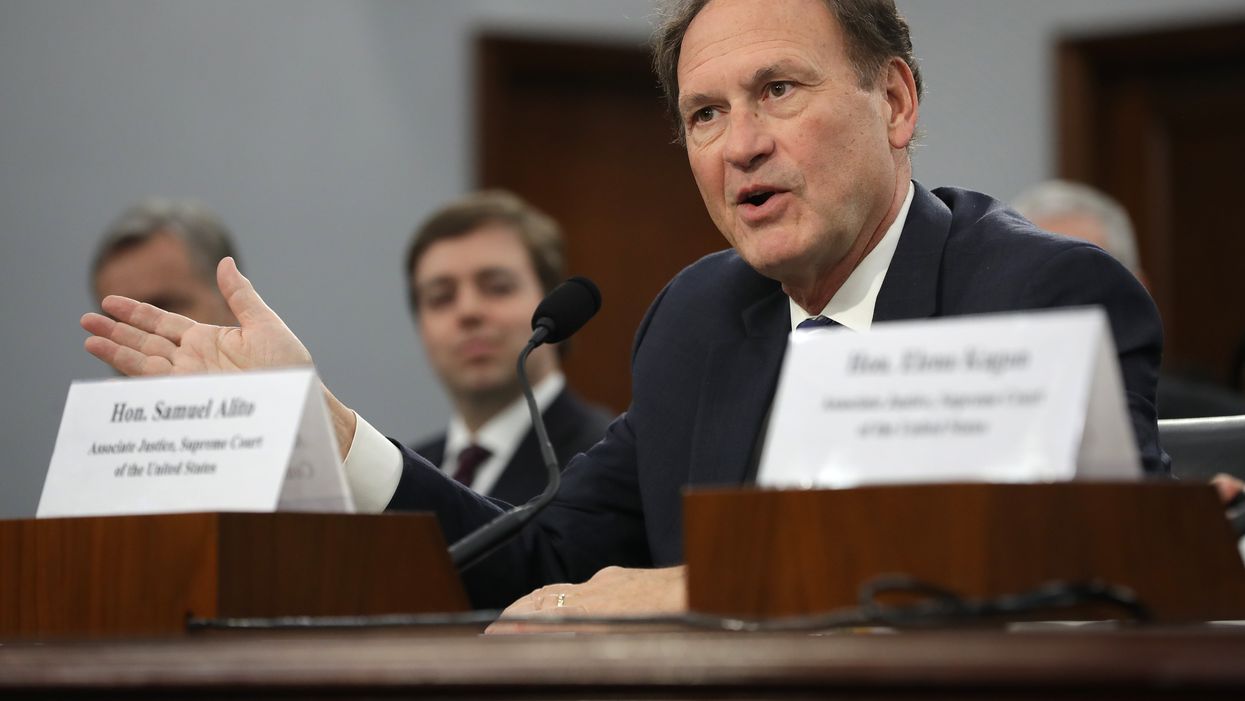Last week, Justice Samuel Alito delivered a rousing keynote address to the annual convention of the Federalist Society, arguably the nation's most influential conservative legal group.
The speech was starkly different from the guarded public pronouncements that are the usual fare from members of the Supreme Court. Instead, it was a full-throated attack on policies and judicial decisions that, he contended, grant too much power to government agencies charged with protecting public health — and further threaten religious liberties already under assault.
Afterward, one could hardly be blamed for musing on the hypocrisy of Supreme Court nominees who regularly claim they have no political agenda only to pursue such an agenda once they've secured confirmation. It was only last month when the nation witnessed this charade at the Senate Judiciary Committee, with Amy Coney Barrett repeatedly assuring the committee that "I have no mission and no agenda. Judges don't have campaign promises."
Like the newest justice, Alito at his 2006 confirmation hearings promised his political views would be irrelevant to his work on the high court. Then on a federal appeals court, he contended there is a stark difference between being a judge and an advocate who "has the goal of achieving the result that the client wants within the bounds of professional responsibility." A judge, he said, "doesn't have an agenda, and a judge has to follow the law."
And when asked if he agreed with a series of Supreme Court rulings, or continued to subscribe to previous criticisms of other decisions, he consistently. refused to answer. He insisted he could not comment on cases or issues that might come before the court, lest he be seen as prejudging them.
Such reticence vanished before the Federalist Society. Alito unburdened himself of grievances, legal and political. And he freely talked about issues already on the Supreme Court docket. He seemed untroubled skating up to the line of ethics rules requiring judges to remain impartial, to avoid any appearance of bias and to avoid public comment on the merits of any pending matter.
About state public health measures attempting to curb the spread of the coronavirus, he observed that "the pandemic has resulted in previously unimaginable restrictions on individual liberty" and asserted that "We have never before seen restrictions as severe, extensive and prolonged as those experienced for most of 2020."
Abandoning the posture he assumed at his confirmation hearings, Alito specifically criticized his own court's recent refusal to stop restrictions imposed by two states to fight Covid-19 — measures, he contended, that "blatantly discriminated against houses of worship."
Those cases reveal what he called "emerging trends in the assessment of individual rights" by the court. "It pains me to say this, but in certain quarters, religious liberty is fast becoming a disfavored right."
The justice proudly proclaimed his belief in the virtues of the 1993 law dubbed the Religious Freedom Restoration Act, even as the court is currently considering a case that could curtail its reach.
And in discussing the 2018 case of a Colorado baker who refused on religious grounds to sell a wedding cake to a gay couple, the justice declared such treatment caused the couple no harm because a nearby baker provided them a "free cake." He professed that view even though a similar issue involving religious freedom and discrimination against same-sex couples is also pending in his courthouse.
Warming to another conservative legal cause celebre, Alito cited what he called the "disturbing trend" of the growing power of federal regulatory agencies. Again, he spoke while the court's docketnow has cases testing the authority of the Federal Communications Commission, the Federal Housing Finance Agency and the Federal Trade Commission.
"Every year," the justice complained, "administrative agencies acting under broad delegations of authority churn out huge volumes of regulations that dwarf the statutes enacted by the people's elected representatives." Echoing the Trump administration's paranoia about a "deep state" and its hostility to science, Alito decried what he called "government by executive officials."
These are hardly the words of a justice without an agenda. Indeed, they seem to be a rallying cry for the Supreme Court's newly augmented conservative majority to use its power to curtail the power of government agencies responsible for protecting public health and safety and to advance the libertarian cause.
As Gabe Roth of Fix the Court, a nonprofit group that has called for stricter ethics rules for the Supreme Court, rightly noted, the speech "was more befitting a Trump rally than a legal society." It provides yet another occasion for Americans to wonder whether our judges can be trusted when they claim that they are merely neutral arbiters of the law.



















Trump & Hegseth gave Mark Kelly a huge 2028 gift